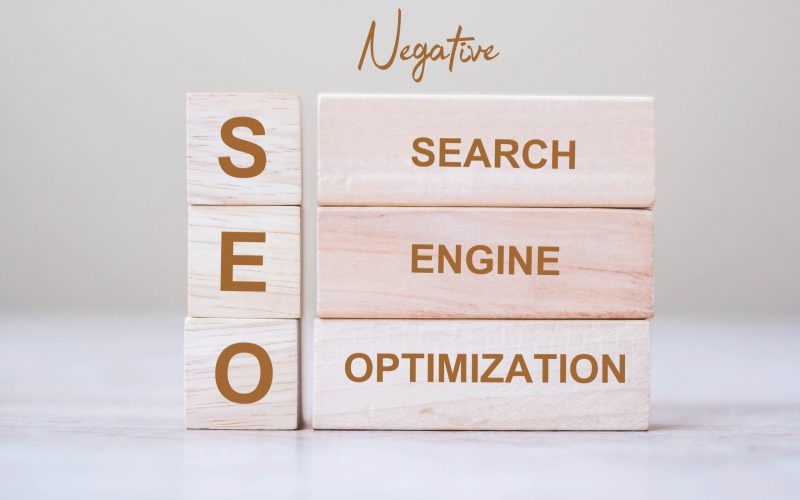SEO is typically used to increase a company’s online presence by enhancing its position in search results. Negative SEO aims to do the exact opposite. Negative SEO experts use unethical strategies to destroy a company’s search engine results. Their intentions differ, but they all revolve around gaining a competitive advantage. There are others who sell similar goods or services to you.
They have two choices if they become envious of your customer base:
- They might use legal marketing tactics to entice your customers away.
- They can take your clients away from your website and steal them.
Competing business owners frequently select the second alternative. They try to reduce visitors to your website in order to affect your sales. As far as they’re concerned, if the approach works so brilliantly that you go out of business, it’s for the best!
When an unscrupulous person takes this route, they’ll most likely use a range of strategies, such as building untrustworthy backlinks to your website, spreading your content to other sites, and eliminating your best-performing backlinks.
Negative SEO Approaches
One of the most aggravating aspects of bad SEO is that you might be targeted without the culprits gaining access to your site. Negative off-page SEO is a term that refers to manipulating a website’s backlinks, duplicating content to make it appear less original to search engines, and otherwise harming a company’s online performance. This section will go through a few of the most frequent off-page strategies.
On-page negative SEO, which involves ways for people to harm your search engine rankings from within your website, is less common. The first stage in this strategy is to hack your site, which is more difficult to execute than the off-page negative SEO methods, hence it’s less popular. However, the final section of this section discusses some of the methods in which users can launch a negative SEO campaign from within your website.
Making Dodgy Backlinks
Backlinks inform search engines that your content is well-liked by others. When Google’s algorithms evaluate your backlinks, for example, a high quantity implies that your material is valuable, and it should be ranked higher in search results.
However, not all backlinks will help you improve your rating. The links that will aid you are from high-authority, well-trusted websites. The ones from sites with a terrible reputation will affect your rankings the most.
While it’s crucial to reduce them to a bare minimum, a couple of bad backlinks won’t doom your search engine ranking. It requires a lot of negative backlinks to accomplish this. There are entities called link farms that can provide all of those backlinks, and negative SEO practitioners make extensive use of them.
A link farm is a collection of interconnected websites that are linked to each other in order to boost their rankings in search results. People used to buy links from these websites, sit back, and enjoy the quick ranking boost.
After that, Google’s search algorithms were modified, and anyone who continued to use such deceptive link-building tactics had their site fall to the bottom of the search results. That’s when link farms began to be used as a negative SEO tactic.
Now that everyone knows how damaging a slew of bogus backlinks can be, they’re being used to harm your site’s rankings. Backlinks that were once used for good SEO are now being sold to people who want to attack your website and cause you harm.
Content Duplication

The majority of website owners seek to develop unique content because they know it helps their site rank higher in search engines.
When you compose an original post for your website and publish it, it is considered unique content because it is not found anywhere else. But what if that article is taken and published on other websites? Your article is still original, but it is no longer unique in the eyes of search engines.
While search engines may detect content duplication and may be able to identify your site as the original source, you shouldn’t bank on it. If the duplicated version of your material is indexed before yours, your content will be considered a duplicate, and links to it will suffer in search results.
Getting Rid of Your Backlinks
While having a large number of sites link to you can help your SEO, Google goes to considerable efforts to assess the worth of your backlinks. The authority of the linked site, the context of the link, and the length of time the link has been published are all factors considered. Backlinks that satisfy the criteria are seen as high-quality links by search engines, and they are given greater weight when ranking your site.
Negative SEO professionals will go after those high-performing backlinks!
Someone can delete your most effective backlinks by launching a particularly obnoxious sort of negative SEO campaign. The person who is doing it to you will contact the owner of the website hosting the link and request that it be deleted. It’s not difficult to come up with a justification that seems real, and this is how individuals fool site owners into thinking it’s a legitimate request.
False Testimonials
The key to local SEO is to amass a fair quantity of favourable reviews. You’ll see a boost in your search rankings if you can get your number of positive reviews into the double and triple digits.
While search engines provide high rankings to sites with a lot of positive ratings, they penalize sites with a lot of negative ones. Negative SEO experts are aware of this, so they utilize bots to generate a deluge of negative reviews, pushing your site to the bottom of search results.
Crawling Your Website in an Attempt to Slow It Down
A high server load can cause your website slow. The site’s performance could deteriorate to the point where it crashes. You may take it as a good thing, improve your bandwidth, and move on if it happened due to a true rise in business.
Unfortunately, a rapid spike in web server resources is rarely the result of a sales surge. Someone crawling your site is significantly more likely.
Crawling a website on a regular basis is a vital aspect of keeping it at top performance, but it consumes a lot of resources. Hackers will devise methods to crawl your site indefinitely, burdening the server to the point where it slows down or crashes.
Google Crawling is also how Google indexes and organizes your website. If Google is unable to crawl your site due to its slowness, this might have a negative impact on your rating.
Hacking Your Site
People attempting to harm your search engine rankings from within your website is a more difficult form of bad SEO. Once they get access, they may unleash all kinds of havoc.
They’ll change your content, and they’ll be sneaky about it, disguising spammy links as invisible text on your page. No one will see it until they look at the HTML, but search engines will, and you will be penalized.
Modifying your robots.txt file is another approach to get your site deindexed. Hackers can tell Google to ignore your website by simply inserting a prohibition rule.
They may even alter your redirects, sending users to your competitor’s site rather than yours.
These negative SEO circumstances can be a real pain in the neck for a small business owner, but as we’ll see in the next section, there are steps you can take to protect yourself.
NEGATIVE SEO: HOW TO REACT
Dodgy Backlinks: How to Avoid Them
Content Duplication Avoidance
The key to preventing this type of poor SEO from having any significant influence is to keep an eye out for copied content on a regular basis. You can hunt down your stolen content using technologies like Copyscape.com. Simply enter your material’s URL, and the programme will generate a report listing every other instance of that content on the internet.
Find your stolen content as soon as possible. You’ll be able to get it deleted and reclaim the ranks your original content obtained.
Keeping Your Best Backlinks
Defending Against False Testimonials
Preventing crawlers from attempting to slow down your website
Preventing your website from being hacked
Summing Up!
We’ve looked at what negative SEO is and how negative SEO attacks are carried out. There’s no denying that negative SEO is a dreadful thing to have to deal with. However, if you take some safeguards and work with an expert digital marketing company, your chances of being a victim are reduced.
You don’t have to accept it if someone succeeds in undermining your search engine rankings. Because the strategies are easy to spot, you can stop them before they cause serious harm.





